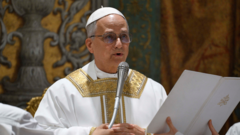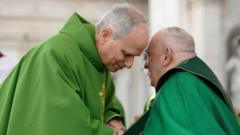**People from all walks of life gather to honor the late pontiff, reflecting on his commitment to the disenfranchised and his call for a more inclusive Church.**
**World Mourns the Loss of Pope Francis: A Beacon for the Marginalized**

**World Mourns the Loss of Pope Francis: A Beacon for the Marginalized**
**Pope Francis passes away at 88, leaving behind a legacy of compassion and social justice that resonated worldwide.**
April 21, 2025
Pope Francis, who served as the spiritual leader of over a billion Catholics, passed away on April 21, 2025, at the age of 88. His demise has sent shockwaves throughout the globe, with countless mourners flocking to St. Peter’s Square to pay tribute to a pope known for his advocacy of the marginalized and his dedication to social justice.
The Vatican confirmed the news in a solemn announcement early Monday morning, with Cardinal Kevin Farrell stating that “the Bishop of Rome, Francis, returned to the house of the Father” at 7:35 a.m. The announcement came just a day after the pontiff blessed the faithful in St. Peter’s Square during Easter celebrations, leaving many in disbelief at the sudden nature of his passing.
The loss of Pope Francis marks an end to a papacy characterized by a focus on inclusivity and outreach. Prominent world leaders and Catholics alike have praised his commitment to the poor, refugees, and social justice, establishing a legacy that is expected to leave a profound impact on the future of the Catholic Church. For Francis, addressing the plight of the less fortunate was fundamental to his mission.
Amidst the mourning, people gathered from various backgrounds, illustrating the broad impact of his teachings. “Even though we saw him yesterday, his passing is a tragic ending no one expected,” lamented one Italian mourners. “He symbolized hope, tolerance, and compassion for many of us.”
As tributes poured in, U.N. Secretary-General António Guterres remarked that Pope Francis would be remembered as “a messenger of hope, humility, and humanity.” He emphasized Francis’s legacy of speaking for those often left voiceless in society. Former U.S. President Barack Obama also weighed in, noting the pope's unique ability to inspire individuals to strive for betterment.
The next few weeks will be significant as the Church prepares for a transition in leadership. Cardinal Farrell will assume administrative responsibilities during this interim period until a new pope is elected, a process described as complex and steeped in tradition. Observers are keen to see whether the College of Cardinals opts for a candidate who will continue Francis's progressive agenda or lean toward a more traditional approach.
Supporters of Francis celebrate his approach to Church governance, which focused on decentralization and an emphasis on inclusivity. His advocacy for interfaith dialogue and humanitarian issues placed him at odds with more conservative figures, making him a pivotal voice for modern Catholicism.
Pope Francis’s health struggles had been evident in past months, culminating in a hospitalization for pneumonia earlier this year. His consistent messages advocating for migrants and the marginalized remained strong even in his final addresses, highlighting issues of injustice and urging greater compassion worldwide.
As the faithful reflect on the teachings and values instilled by Pope Francis, many hope for a successor who embodies the principles of unity and care that he championed. The spiritual future of the Church now hangs in the balance as a diverse group of candidates prepares to take on the mantle of leadership.
Among the questions left in the wake of the pope's passing is how deeply his vision of a more inclusive Church can be carried forward, and whether the legacy of his teachings will inspire future leaders to respond to the challenges of our time.
Pope Francis's commitment to the peripheries, his empathy towards the disenfranchised, and his unique approach to spirituality will undoubtedly echo through the hearts of many as they gather in prayer and remembrance during this period of mourning and reflection.
Pope Francis, who served as the spiritual leader of over a billion Catholics, passed away on April 21, 2025, at the age of 88. His demise has sent shockwaves throughout the globe, with countless mourners flocking to St. Peter’s Square to pay tribute to a pope known for his advocacy of the marginalized and his dedication to social justice.
The Vatican confirmed the news in a solemn announcement early Monday morning, with Cardinal Kevin Farrell stating that “the Bishop of Rome, Francis, returned to the house of the Father” at 7:35 a.m. The announcement came just a day after the pontiff blessed the faithful in St. Peter’s Square during Easter celebrations, leaving many in disbelief at the sudden nature of his passing.
The loss of Pope Francis marks an end to a papacy characterized by a focus on inclusivity and outreach. Prominent world leaders and Catholics alike have praised his commitment to the poor, refugees, and social justice, establishing a legacy that is expected to leave a profound impact on the future of the Catholic Church. For Francis, addressing the plight of the less fortunate was fundamental to his mission.
Amidst the mourning, people gathered from various backgrounds, illustrating the broad impact of his teachings. “Even though we saw him yesterday, his passing is a tragic ending no one expected,” lamented one Italian mourners. “He symbolized hope, tolerance, and compassion for many of us.”
As tributes poured in, U.N. Secretary-General António Guterres remarked that Pope Francis would be remembered as “a messenger of hope, humility, and humanity.” He emphasized Francis’s legacy of speaking for those often left voiceless in society. Former U.S. President Barack Obama also weighed in, noting the pope's unique ability to inspire individuals to strive for betterment.
The next few weeks will be significant as the Church prepares for a transition in leadership. Cardinal Farrell will assume administrative responsibilities during this interim period until a new pope is elected, a process described as complex and steeped in tradition. Observers are keen to see whether the College of Cardinals opts for a candidate who will continue Francis's progressive agenda or lean toward a more traditional approach.
Supporters of Francis celebrate his approach to Church governance, which focused on decentralization and an emphasis on inclusivity. His advocacy for interfaith dialogue and humanitarian issues placed him at odds with more conservative figures, making him a pivotal voice for modern Catholicism.
Pope Francis’s health struggles had been evident in past months, culminating in a hospitalization for pneumonia earlier this year. His consistent messages advocating for migrants and the marginalized remained strong even in his final addresses, highlighting issues of injustice and urging greater compassion worldwide.
As the faithful reflect on the teachings and values instilled by Pope Francis, many hope for a successor who embodies the principles of unity and care that he championed. The spiritual future of the Church now hangs in the balance as a diverse group of candidates prepares to take on the mantle of leadership.
Among the questions left in the wake of the pope's passing is how deeply his vision of a more inclusive Church can be carried forward, and whether the legacy of his teachings will inspire future leaders to respond to the challenges of our time.
Pope Francis's commitment to the peripheries, his empathy towards the disenfranchised, and his unique approach to spirituality will undoubtedly echo through the hearts of many as they gather in prayer and remembrance during this period of mourning and reflection.





















